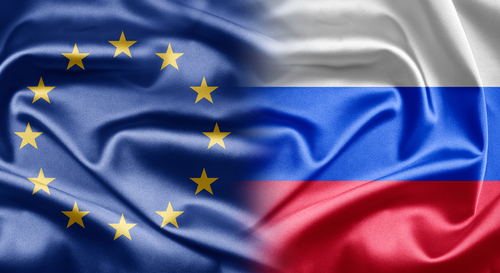Negotiations for a new EU-Russia agreement are proving long and complicated.
Formal EU relations with Russia

Used under license from Shutterstock.com.
The 1994 Partnership and Cooperation Agreement (PCA) has been in force since 1997. A new agreement to take account of the changed circumstances of the two parties has been under negotiation since 2008, but EU Member States (MS) and institutions are divided on whether relations can be upgraded despite concerns over human rights and democracy in Russia. This disunity weakens the EU and according to “EU-Russia Watch” contributes to Russia preferring to deal with individual MS instead of the EU. A Council paper sets out some of the problematic issues.
Russia and the EU are also “strategic partners“. However, for many commentators, frequent disagreements over fundamental values show that the partnership is a rather empty concept. An EU-Russia summit was held in June 2012, and the next is planned for 21 December 2012.
Until a new agreement is in place, the PCA is prolonged each year. In 2003 it was fleshed out with the aid of four “Common Spaces” on: economic issues and the environment (helping to boost investment and trade), freedom, security and justice (including the rule of law and human rights), external security (including crisis management and non-proliferation), and research and education (promoting scientific, cultural, and educational cooperation).
A “Partnership for Modernisation” (PfM, work plan) was launched in 2010 to build on the results of the Common Spaces in order to advance, and increase links between the EU and Russian economies (particularly after the economic crisis), and bring citizens closer. The PfM concerns mainly “low politics” which do not cause too much conflict (e.g. promoting small enterprises, transport, energy efficiency, innovation, intellectual property rights enforcement) and some that might prove more difficult to advance (effective functioning of the judiciary, fight against corruption).
Policy issues
Energy is a pivotal issue for the EU’s relations with Russia. In 2009, the EU imported 36% of its gas from Russia and 31% of its crude oil. Russia withdrew from the Energy Charter Treaty and criticised the third energy package for its provisions to separate production companies from networks, which would weaken Gazprom.
On trade, the EU welcomed Russia’s August 2012 WTO accession, but expressed disappointment at its latest protectionist measures.
Negotiations on visa liberalisation are fraught with distrust and retaliatory actions. Global Insight said recently that the EU is not successful in trying to use visas as leverage to convince Russia to uphold human rights (for example in Chechnya and the North Caucasus).
EP positions
The report by Hannes Swoboda (S&D, Austria) agreed on 18 October 2012 by AFET (with INTA opinion) on the negotiation of the new EU-Russia agreement recommends to the Council, Commission and External Action Service that: European interests and values should be promoted, and a strategic partnership needs both sides to “follow democratic principles”. Russia should accompany its economic modernisation with political reform, guaranteeing the rule of law and fighting corruption. The report also points to media freedom, anti-discrimination, and freedom of speech and of assembly.
In 2012, the EP also passed resolutions on the political use of justice in Russia,the country’s accession to the WTO and other trade topics, and a recommendation to the Council on establishing visa restrictions for Russian officials involved in the Sergei Magnitsky case.
Main reference:
The European Union and Russia / Serena Giusti; Tomislava Penkova, in: The foreign policy of the European Union: assessing Europe’s role in the world/ Federiga Bindi; Irina Angelescu (eds.), Washington, D.C., 2012.








[…] Wednesday, EU-Russia relations were on the agenda. Our briefing explained why negotiations for a new EU-Russia agreement are proving long and […]